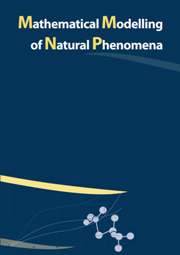Crossref Citations
This article has been cited by the following publications. This list is generated based on data provided by
Crossref.
Aniţa, S.
Hritonenko, N.
Marinoschi, G.
Swierniak, A.
Anita, S.
Hritonenko, N.
Marinoschi, G.
and
Swierniak, A.
2014.
Preface.
Mathematical Modelling of Natural Phenomena,
Vol. 9,
Issue. 4,
p.
1.
Aniţa, Laura-Iulia
Aniţa, Sebastian
and
Moroşanu, Costică
2015.
Optimal strategies to diminish a pest population via bilinear controls.
Applied Mathematics Letters,
Vol. 40,
Issue. ,
p.
7.
Belyakov, Anton O.
and
Veliov, Vladimir M.
2016.
Dynamic Perspectives on Managerial Decision Making.
Vol. 22,
Issue. ,
p.
149.
Bouguima, S.M.
and
Benzerdjeb, S.
2016.
An age-structured fishery model: Dynamics and optimal management with perfect elastic demand.
Applied Mathematical Modelling,
Vol. 40,
Issue. 1,
p.
218.
Chen, Mayee
and
Shi, Junping
2017.
Effect of rotational grazing on plant and animal production.
Mathematical Biosciences and Engineering,
Vol. 15,
Issue. 2,
p.
393.
Colombo, Rinaldo M.
and
Garavello, Mauro
2017.
Control of biological resources on graphs.
ESAIM: Control, Optimisation and Calculus of Variations,
Vol. 23,
Issue. 3,
p.
1073.
Breiten, Tobias
Kunisch, Karl
and
Pfeiffer, Laurent
2018.
Infinite-Horizon Bilinear Optimal Control Problems: Sensitivity Analysis and Polynomial Feedback Laws.
SIAM Journal on Control and Optimization,
Vol. 56,
Issue. 5,
p.
3184.
da Silva Filho, Cícero Alfredo
and
Boldrini, José Luiz
2018.
An analysis of an optimal control problem for mosquito populations.
Nonlinear Analysis: Real World Applications,
Vol. 42,
Issue. ,
p.
353.
Golubtsov, Peter
and
Steinshamn, Stein Ivar
2019.
Analytical and numerical investigation of optimal harvest with a continuously age-structured model.
Ecological Modelling,
Vol. 392,
Issue. ,
p.
67.
Aniţa, Sebastian
and
Moşneagu, Ana-Maria
2019.
Optimal Harvesting for Size-Dependent Control.
Vietnam Journal of Mathematics,
Vol. 47,
Issue. 4,
p.
881.
Upmann, Thorsten
and
Behringer, Stefan
2020.
Harvesting a remote renewable resource.
Theoretical Ecology,
Vol. 13,
Issue. 4,
p.
459.
Ali Al-Radhawi, M.
Margaliot, Michael
and
Sontag, Eduardo D.
2021.
Maximizing average throughput in oscillatory biochemical synthesis systems: an optimal control approach.
Royal Society Open Science,
Vol. 8,
Issue. 9,
p.
210878.
Guilmeau, Thomas
and
Rapaport, Alain
2022.
Singular Arcs in Optimal Periodic Controls for Scalar Dynamics and Integral Input Constraint.
Journal of Optimization Theory and Applications,
Vol. 195,
Issue. 2,
p.
548.
Bondarev, Anton
and
Upmann, Thorsten
2022.
Sliding modes in the management of renewable resources.
Automatica,
Vol. 144,
Issue. ,
p.
110487.
Ofir, Ron
Kriecherbauer, Thomas
Grüne, Lars
and
Margaliot, Michael
2023.
On the gain of entrainment in the
n
-dimensional ribosome flow model
.
Journal of The Royal Society Interface,
Vol. 20,
Issue. 199,
Gromov, Dmitry
Shigoka, Tadashi
and
Bondarev, Anton
2023.
Optimality and sustainability of hybrid limit cycles in the pollution control problem with regime shifts.
Environment, Development and Sustainability,
Vol. 26,
Issue. 4,
p.
10701.
Katz, Rami
Kriecherbauer, Thomas
Grüne, Lars
and
Margaliot, Michael
2024.
On the Gain of Entrainment in a Class of Weakly Contractive Bilinear Control Systems.
SIAM Journal on Control and Optimization,
Vol. 62,
Issue. 5,
p.
2723.
Aniţa, Sebastian
Capasso, Vincenzo
and
Scacchi, Simone
2024.
Mathematical Modeling and Control in Life and Environmental Sciences.
p.
77.
Filho, Cícero Alfredo da Silva
and
Boldrini, José Luiz
2024.
Mathematical analysis of a non‐convex optimal control problem for age‐structured mosquito populations.
Mathematical Methods in the Applied Sciences,


